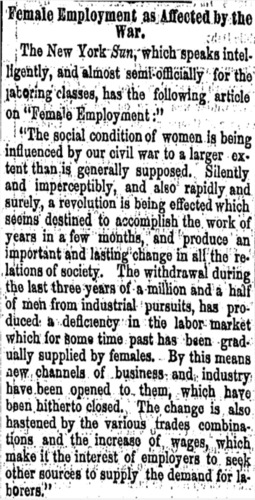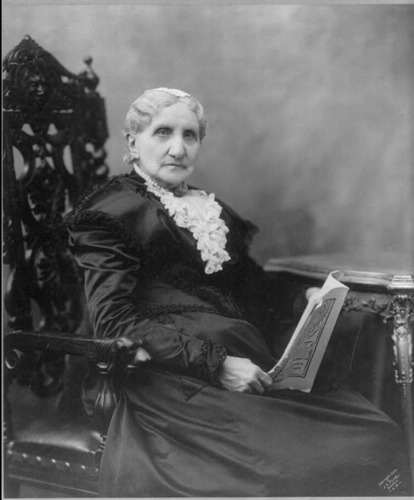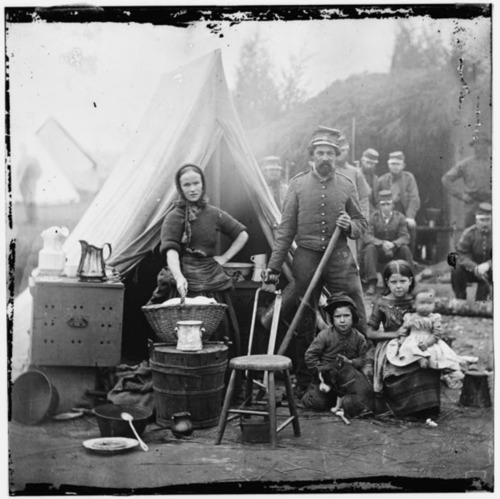After The War
Women's support during the Civil War was extremely significant. During the war, hundreds of women joined organizations that raised money and gathered medical supplies for soldiers. Women held fairs that raised money for the war effort and wrote ads in newspapers asking for financial donations. Some women started working in factories, replacing men who went off to fight. Many others took up nursing and cared for soldiers, not only physically, but also mentally by offering their compassion and care.
Women were no longer confined to their houses to mind the children, they had become a very important part of society. After the war ended, many women were not eager to go back to their daily lives simply serving men.
Though the suffrage movement had begun before the Civil War started, many women took a pause in their activism to support the war effort. However, after the war ended women had a new purpose, and the suffragette's voice was louder than ever.
Mary Livermore (1820-1905) was a suffragist, abolitionist, and journalist. After supporting the Civil War by visiting hospitals and military posts, contributing to the press, answering correspondences, and more she traveled around the country giving speeches in support of women's suffrage. One of her more famous works is "What Shall We Do With Our Daughters", in it she wrote,
"Humanity has moved forward to an era where wrong and slavery and being displaced, and reason and justice are being recognized as the rule of life... It could not be possible in such an era but that women should share in the justice and kindliness with which the time is fraught.
A great wave is lifting them to higher levels... [it is] emancipating them from the seclusion of the past, and adding to the sum total of the world's worth and wisdom.
[Young women] are to be weighted with heavy duties and to assume heavier responsibilities; for the days of the tutelage seem to be ended for civilized women, and they are to think and act for themselves."
Although many women returned to their traditional roles after the war, it still marked a significant turning point for women in the United States. A few women got recognition for their role in the war. Some received a pension or reimbursement for their effort.
Some women remained in their previously "male" roles, as the war drastically reduced the number of men available to fill these roles. Others had lost their husbands in the war and now had to make their own money. Many women who lost their husbands were now in full control of their farms and businesses.
After the war ended, the 14th and 15th Amendments were added to the Constitution. The 14th defined the definition of citizens that were protected by the Constitution as male, and the 15th gave Black men the right to vote.
Many women saw this as their chance to push for women's rights and in 1869 the National Woman Suffrage Association was founded by Susan B. Anthony and Elizabeth Cady Stanton.
For the first time, in 1870, the Census Report listed "Females Engaged in Each Occupation".
However, it wasn't until 1920 that women were finally given the right to vote.
Sources:
Hilde, Libra R.. Worth a Dozen Men : Women and Nursing in the Civil War South. Charlottesville: University of Virginia Press, 2012. Accessed February 11, 2022. ProQuest Ebook Central.
"Female Employment as Affected by the War." Milwaukee Daily Sentinel, May 16, 1864. Nineteenth Century U.S. Newspapers (accessed February 10, 2022).
Foner, Eric, and Mary Livermore. Voices of Freedom: A Documentary History, W.W. Norton & Company, New York, 2020, pp. 289–292.
Pacific Commercial Advertiser. "$5, 500 from the Ladies of the Sandwich Islands to Aid the 'Christian Commission'." National Intelligencer, March 2, 1865. Nineteenth Century U.S. Newspapers (accessed February 10, 2022).
https://www.womenhistoryblog.com/2015/01/womens-rights-after-the-civil-war.html


